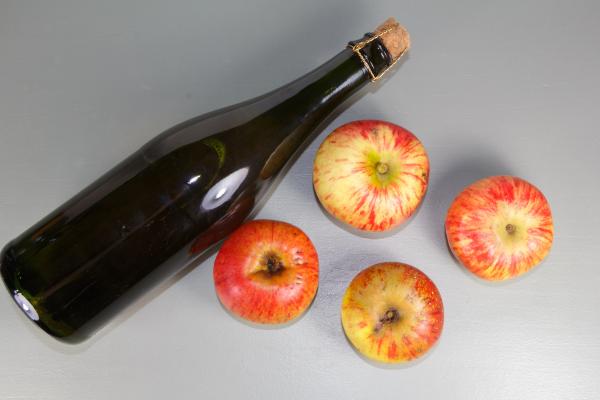As an experienced brewer, I have frequently been asked whether or not cider will explode on a plane.
This is a concern for many people who want to bring their homemade cider with them when they travel or send it to friends and family as a gift.
Because cider has a lower pressure than most champagnes or sparkling wines, but are still stored in thick glass bottles, it is unlikely that a cider bottle will explode on an airplane. However, it does depend on several factors that I will get into below.
In this blog post, I will cover the factors that could potentially cause cider to explode on a plane, how to prevent this from happening, and some additional tips for traveling with cider.
Fermentation and Pressure
Cider, like any other fermented beverage, contains carbon dioxide which is a byproduct of the fermentation process. When bottled, this carbon dioxide is trapped inside and creates pressure. The pressure inside a bottle of cider increases with temperature and altitude, which is why this question is often asked in relation to air travel.

The Effects of Temperature
During a flight, the cargo hold of an airplane can experience temperature fluctuations. These fluctuations can cause the cider inside the bottle to expand and contract, which could potentially lead to the bottle leaking or even exploding. However, this is unlikely to happen if the cider is properly packaged and stored.
The Effects of Altitude
The pressure inside an airplane changes as it ascends and descends. At cruising altitude, the pressure inside the cabin is lower than the pressure at sea level. This means that the pressure inside a bottle of cider will be higher relative to the surrounding air pressure, which could potentially cause the bottle to leak or explode. Again, this is unlikely to happen if the cider is properly packaged and stored.
Proper Packaging and Storage
To prevent your cider from exploding on a plane, it is important to package it correctly. Use bottles that are designed to withstand pressure, such as champagne bottles or other heavy-duty glass containers. Ensure that the bottles are properly sealed with airtight caps or corks.
Additionally, you should store the cider in a cool, dark place prior to your flight to minimize temperature fluctuations.
Transporting Cider in Checked Luggage
When traveling with cider, it is best to pack it in your checked luggage. This will allow you to safely package the cider with bubble wrap or other protective materials to minimize the risk of damage during transport. Additionally, checked luggage is typically stored in a cooler part of the plane, which will help to keep the cider at a stable temperature.
Transporting Cider in Carry-On Luggage
If you must transport cider in your carry-on luggage, there are some precautions you should take. First, make sure that the bottle is small enough to comply with liquid restrictions for carry-on luggage. Second, ensure that the bottle is properly sealed and packaged to prevent leaks. Finally, be prepared to explain the contents of your bottle to airport security, as they may question the presence of a liquid in your carry-on.
Shipping Cider via Air Cargo
If you are sending cider to friends or family as a gift, you may choose to ship it via air cargo. This can be a safe and effective way to transport cider, provided that you follow proper packaging guidelines. Be sure to clearly label the package as containing glass and fragile items, and consider purchasing insurance for added protection.
Conclusion
In conclusion, cider will not explode on a plane if it is properly packaged and stored. To minimize the risk of damage during transport, follow these tips:
1. Use heavy-duty glass bottles designed to withstand pressure.
2. Properly seal the bottles with airtight caps or corks.
3. Store the cider in a cool, dark place prior to your flight.
4. Pack the cider in your checked luggage, if possible.
5. Use protective materials like bubble wrap to prevent damage.
6. Comply with liquid restrictions for carry-on luggage.
7. Be prepared to explain the contents of your bottle to airport security.
8. Label packages as containing glass and fragile items when shipping.
9. Consider purchasing insurance for added protection.
10. Enjoy your cider at your destination, knowing you’ve taken the necessary precautions!
FAQs
Can you check hard cider on a plane?
Yes, you can check hard cider on a plane as long as it is properly packaged and meets the airline’s restrictions on liquids and alcohol content. It is recommended to check with the specific airline for their policies on transporting alcohol.
Can you take food and drink in hold luggage?
Yes, you can take food and drink in hold luggage as long as they comply with the airline’s restrictions and regulations regarding the transportation of food items. It is recommended to pack them properly to avoid any spillage or contamination.
What are the things not allowed in check in baggage?
Items that are not allowed in check-in baggage include explosives, flammable items, sharp objects, hazardous chemicals, and illegal substances. Additionally, some airlines may have restrictions on certain electronic devices, lithium batteries, and liquids. It is important to check with the airline and follow their guidelines to avoid any issues during the check-in process.
Can I put food in my hold luggage?
Yes, you can put food in your hold luggage. However, it is important to check with your airline and destination country’s customs regulations for any restrictions on certain types of food items. It is also recommended to pack food items securely and in leak-proof containers to prevent any damage to your luggage or other items.
Can you take cider in hold luggage?
Yes, you can take cider in hold luggage as long as it is properly packaged and within the airline’s restrictions on liquids and alcohol. It is recommended to check with the airline beforehand to ensure compliance with their specific policies.
Can you keep food cold in checked luggage?
No, it is not recommended to keep food cold in checked luggage as the temperature and pressure in the cargo hold may not be suitable for preserving the quality and safety of perishable food items. It is better to use insulated coolers or bags with ice packs and carry them as carry-on luggage.




